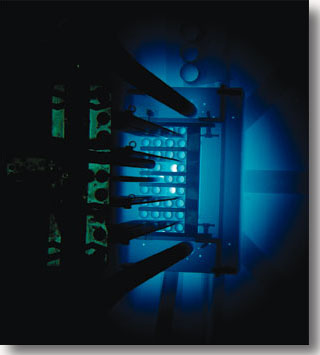
I'd like to start by noting that I was and am very much in favor of Pres.Bush's decision to remove Hussein from power. Yes, he had every right to do so, yes, even had he done so unilaterally. Hussein was a strongman who ruled brutally without any consent from the governed by benefit of the power granted to him through the sale of high tech Western weaponry, with which he and those relatively few close to him successfully crushed a long series of attempted coups, drowning them in blood. Handguns and knives vs. attack helicopters, machine guns, tanks, poison gas, etc. - how, realistically speaking, can that scenario be expected to play out? For the West to claim neutrality, having done so much to tip the balance of power in favor of Hussein in his dealings with his own people, would be absurd.
What is even more absurd is the argument that in some nebulous sense, the US victimized Iraq by invading it. Who in Iraq, specifically, was left with a legitimate grievance? Where there are no victims, there is no victimization, and while there certainly were some casualties of war, there were unusually few of them considering the scope of the operation, and nothing like the body count Hussein was running up. What we are left with, then, is the sobbing of a bully who discovered that a bigger kid was willing to step in and stop him from terrorising the smaller kids (the bully being Hussein's faction), and those softheaded in just the right, trendy way that allows them to sustain the illusion that bullies have the right to proceed unimpeded, as they attack their intended victims. Didn't we outgrow this kind of thinking back in kindergarten? Apparently not.
Then there was the "scandal" of not finding any weapons of mass destruction, aside from the ones that were actually witnessed in use to fill some of those mass graves, I suppose. "But where is your evidence that Hussein was going to make and use MORE poison gas, hmmmmm ...." Yeah. Right. As for the failure to locate any nuclear warheads, let us consider what was being looked for. The plutonium core of a thermonuclear device is about the size of a grapefruit. The rest of the bomb in mostly a mass of Lithium Hydride. The desert in Iraq covers an area about the size of California, one very large haystack in which to drop a few potentially very destructive needles. Take your plutonium core, and find an underwater reservoir of water, or any other hydrogen rich liquid like say ... petroleum. The figure I hear quoted is that five meters of water (about 17 feet worth) will provide the same shielding against radiation as that offered by the earth's atmosphere at the elevation at the top of the Sandia Crest, outside of Albuquerque. Even allowing for the fact that the liquid in and underground reservoir is mixed with substrate material, then, we have the reality that as you drop your core fairly deeply into a reservoir that may go down a few hundred feet, that very little gamma radiation and virtually no neutron radiation will even reach the drier parts of the soil overhead, much less the surface.
The fact, then, that no warheads were found is not informative, because one wouldn't expect to find any. They're just too easy to hide, as common sense should have told many of those offering such sagely smug commentary. Entire cities have been lost in the desert and not been found for centuries, and even small villages do tend to be somewhat larger than grapefruit. This reality is bound to dawn on people, who may find themselves uninclined to listen to the peaceniks when they realize how weak the arguments they had been offered by that crowd often were, and this can be regrettable. The problem is that the peaceniks are not always wrong. I'm wondering if we're approaching one of those moments when they aren't, and if so, whether or not they'll be listened to, after their previous ranting.
Iran is not Iraq. While it is certainly not a society that I or most Americans would care to live in, the revolution that introduced its current form of repression did seem to be a popular one, so we begin without the likelihood of winning the hearts and minds of the Iranian people, should our army invade that nation of over 68 million people. We'd be sending our army into a likely bloodbath were we to go that route, and I would hope that we would respect the sacrifices made by our armed forces enough to not ask them to walk into one of those, lightly. But if Iran remains defiant, do we have another choice? Possibly yes, and here's one we might consider: walking away and leaving this one alone.
I have the strangest feeling of deja vu, right now, remembering these bizarre shouting matches (as if they weren't all bizarre) I used to have with extreme liberals, who'd be appalled by my support for the commercial use of nuclear power. "Oh yeah, what about Hiroshima", displaying a mystifying inability to distinguish between the use of a nuclear reactor and a nuclear warhead. But this time, we have some conservatives not getting the distinction and that is truly strange. Eight percent enrichment of uranium is not 90 per cent, no matter how one may try to dance around the subject, and do we really want to be in the position of telling the Iranians that peaceful technological progress is forbidden to them? How would we react to such a proclamation, especially in an era in which discussion of what to do when the oil becomes scarce has already become so very topical?
If there were some real reason to suspect that Iran intended to build a hydrogen bomb, we MIGHT have some cause for concern. (Note that the military nuclear club already has one Islamic member - Pakistan. How many warheads has it used so far?) But if there is evidence for this, I have yet to hear about it. What I am seeing is some heavy handed pressure being used in an attempt to keep Iran from doing something that it has every right to do, so far seems to pose no credible threat to anybody, and in the long run, might just make Iran LESS dangerous.
Yes, you read that right. Less dangerous. Why? Think about it. What is the argument for thinking that if Muslims get the H bomb, that they will necessarily use it? Aside from the ons who already have it, and haven't used it, I mean? The Islamic belief that if one dies in the service of God, that the wonders of Paradise will await one. Well, excuse me, but exactly how is that different from what Christianity teaches, on the same subject?
While we're thinking about it, I'd also like to remind some of one of the images from the end of the first Gulf War - that of Iraqi soldiers coming out of their bunkers, terrified for their lives (as well they might be), kneeling before the victorious American forces and kissing their hands in a gesture of humility, submission and anything else that might keep them from being shot, blown up or incinerated. They certainly didn't seem that indifferent to their own survival, Muslims though they were. One might think that people would have noticed that, but for some reason, many of our citizens don't seem to want to do so, preferring a demonic enemy we can't understand or an angelic adversary who would treat us with all gentle grace were we to but smile glady upon its numbers, to the messy flesh and bloody reality of dealing with another mixed bunch of flawed human beings, with whom one must measure one's severity and compassion with prudence and at least moderately difficult deliberation. Angels (as seen by liberal commentators) and devils (as seen by neocon ones) are so much more comfortable to deal with, because one can deal in simpleminded absolutes, and without doubt.
But sometimes we need to get back to reality.
Let us ponder this. Why would any Christian hesitate to be a martyr, with such wonderful rewards waiting for him in Heaven? Yes, he would be leaving his family behind, but surely they could find opportunities to join him and ... appalling image, isn't it - a chain suicide by proxy. But why do we hesitate? Why are we horrified? Because we know that faith isn't knowledge. We may believe that an afterlife is waiting for us, but there is that nagging doubt, and one's very existence is a lot to put at risk. If your life is basically good, that can be a lousy deal. But if your life seems so inescapably wretched that the theoretical rewards granted by God to the martyr are the only hope one sees for a bearable existence, then the logic of one's situation changes greatly. Look at the past pattern of performance by the civilizations in question - in the Middle Ages, when life was far harder for the Europeans than for the Muslims, religious fanaticism was more common in the West than the Middle East and now, over the centuries, the roles have reversed.
This is one reason why I am reluctant to go along with Bush's position. While building nuclear warheads wouldn't contribute positively to the very prosperity that may help make throwing one's life away less appealing to the young people of Iran, building nuclear reactors just might, especially after the oil starts to get scarce. Reactors offer power, not just for lighting and heating homes, but for keeping factories and farms going as well, and while our country seems determined to forget this, it is those basic sectors of the economy (manufacturing and agriculture) upon which much of the wealth that the financial sector channels depends. Cripple those, and pushing for the acceptance of free market reforms is going to be a quixotic gesture, because market mechanisms won't have any resources to help allocate.
Iran has a right to a future, and there is no future in technological stagnation. Nor is there much of a one in remaining dependent on outsiders in order to function at all, which is what is wrong with the self-serving Russian suggestion that the Iranians have their uranium processed in Russia, no doubt for a modest fee per unit mass of uranium enriched. What some of us need to remember is that when one fight to close off another's path to a brighter future, one corners him into fighting back, and if one leaves him with little to lose, one leaves him with little to fear. We can do better than that, and often have. Now would be a good time to do so, while the West can still claim the moral high ground. |












